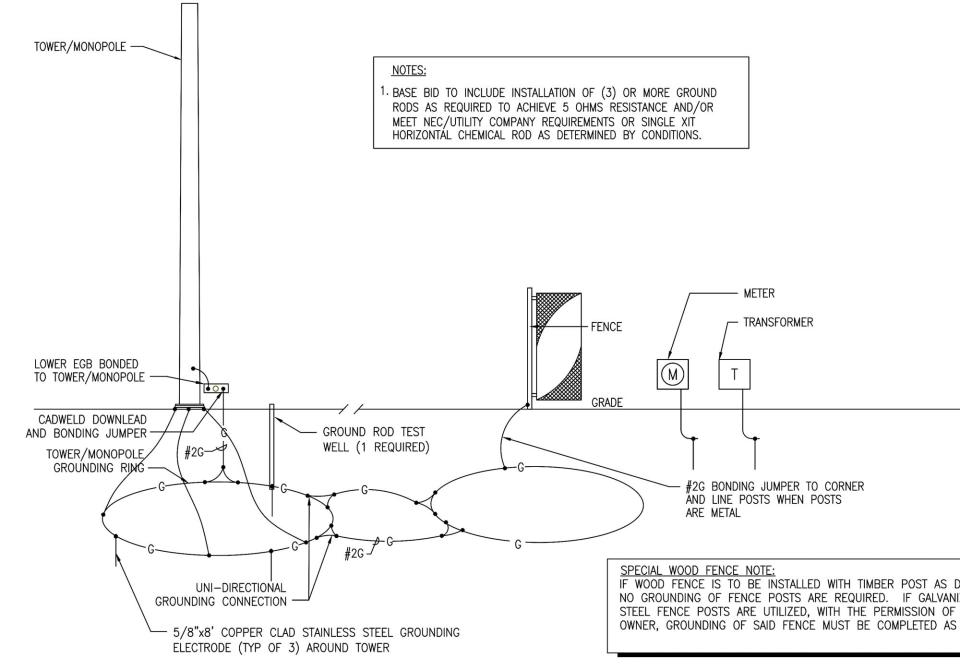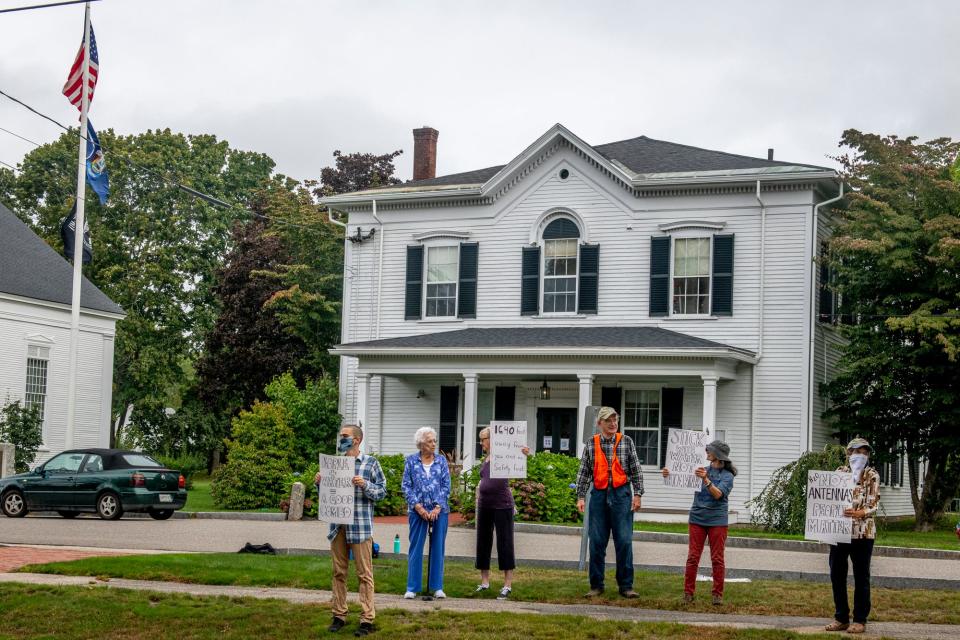Vertex Towers threatens lawsuit if York rejects 120-foot cell tower project
YORK, Maine — A wireless infrastructure company is threatening legal action in federal court if the Appeals Board rejects their request for a variance to put a new cell tower in downtown York.
Vertex Towers is asking the Appeals Board to grant a variance to allow the Massachusetts-based company to build a new 120-foot monopole at 162 York St. in York Village in the woods behind First Parish Church. Cell towers are prohibited in that zone per a voter-approved ordinance, according to town officials, but Vertex told the Appeals Board Aug. 10 federal law allows local officials to permit towers where gaps in cell coverage exist.
“All we need to know is that there’s a gap in coverage, which, you guys can probably tell me more, better, than I can, that there is a gap in coverage in York and that there is no viable alternative,” said Francis Parisi of Vertex to the Appeals Board in their meeting.

Board members initially said there was nothing they believed they could do to grant a variance. Board member Michael Swant read from the town ordinance where it states, “a variance shall not be granted to permit a use or structure otherwise prohibited.”
“The use or structure they’re talking about here is otherwise prohibited in this because it is not in the zone that our voters of York agreed that were zones wireless communications facilities could be placed in,” Swant said. “That being the case, I believe that this board cannot even entertain granting a variance. It’s very, very clear and very specific.”
Nick’s Steakhouse opens in York: Top-tier steaks, 100 different bourbons and more
Board Chair Joe Carr said he agreed the ordinance clearly prohibits cell towers in that zone.
“I’d love to have cell service in the center of town and a lot of places, but we can only do what we have to do,” Carr said.
Parisi said federal law supersedes local laws from banning telecommunications in particular areas, especially when gaps in cell coverage exist. He said Vertex presented the Appeals Board with extensive documentation showing there were no alternatives to the site at 162 York St., and that they believe federal law allows the board to grant a use variance.
The town’s proposed comprehensive plan, Parisi noted, also includes the goal of improving telecommunications, pointing to information about the plan posted on the walls of the meeting room.
He recommended the board check with the town’s legal counsel to see if they would advise rejecting the variance, as they could expect the next step to be a filing in federal court by Vertex.
“It’s a very long, arduous process, expensive process for both of us,” Parisi said. “Given the fact that everyone wants it, why don’t we try to find a way to get there without litigation.”
Proposed ordinance change: Brakes put on electric vehicle charging station mandate in York
The board voted 4-1 to continue the meeting with Swant voting against.
“I don’t know what the federal law says, but I do know what our local ordinances say, and I believe that’s the extent to what this board can do tonight,” Swant said.
Battle over cell towers
Cell towers have been the center of legal battles with municipalities around the country as wireless companies look to build infrastructure to expand service. Municipalities have attempted to block cell towers from being built, and at times have ended up in federal court with varying outcomes.
Tourist attraction upgrade: Mount Agamenticus to get parking, new bathroom facilities
In Rockland, Maine, the Planning Board denied an application for a 120-foot cellphone tower, only to see the developer Bay Communications, LLC, sue the city in federal court, according to a story by WGME. Bay Communications argued the city was prohibiting the company from providing widespread cell service as allowed under federal law, and the city ultimately settled with the developer to allow the tower to be built. The Planning Board is pushing back on the settlement, according to WGME, putting the city at risk of being in contempt of court.

Meanwhile, in Carmel, New York, residents fended off Verizon Wireless from building a 140-foot cell tower at the end of their hilltop cul-de-sac, according to a story by The Journal News. The town’s Planning and Zoning Boards rejected the proposal, but the Carmel Town Board still voted to enter a settlement allowing the tower. A federal judge ruled in July the settlement was unlawful and that the Town Board should not have circumvented the Planning and Zoning Boards, according to the news outlet.
York’s Wireless Telecommunications Facilities Ordinance
York has a Wireless Telecommunications Facilities Ordinance which allows cell towers to be built only in two zones known as overlay districts. One runs along Route 1 and Interstate 95, the other being in a wooded western portion of town. In May, a citizen petition also sought to enact a moratorium on cell towers in York, but that was defeated at the polls.
York resident Donna Bakke, who has called for residents to encourage the Appeals Board to reject the variance request for Vertex, said she remains optimistic that the town’s ordinance could be upheld. Her concern is that the threat of legal action will still cause the town to fold before it takes a chance at defending its ordinance in court against Vertex.
“If (Vertex) are willing to spend the money to go to court, that’s unfortunate, because the town may balk at that,” Bakke said. “I think at this point they (Vertex) don’t have a leg to stand on.”
This article originally appeared on Portsmouth Herald: Vertex Towers threatens lawsuit if York Maine rejects cell tower project

